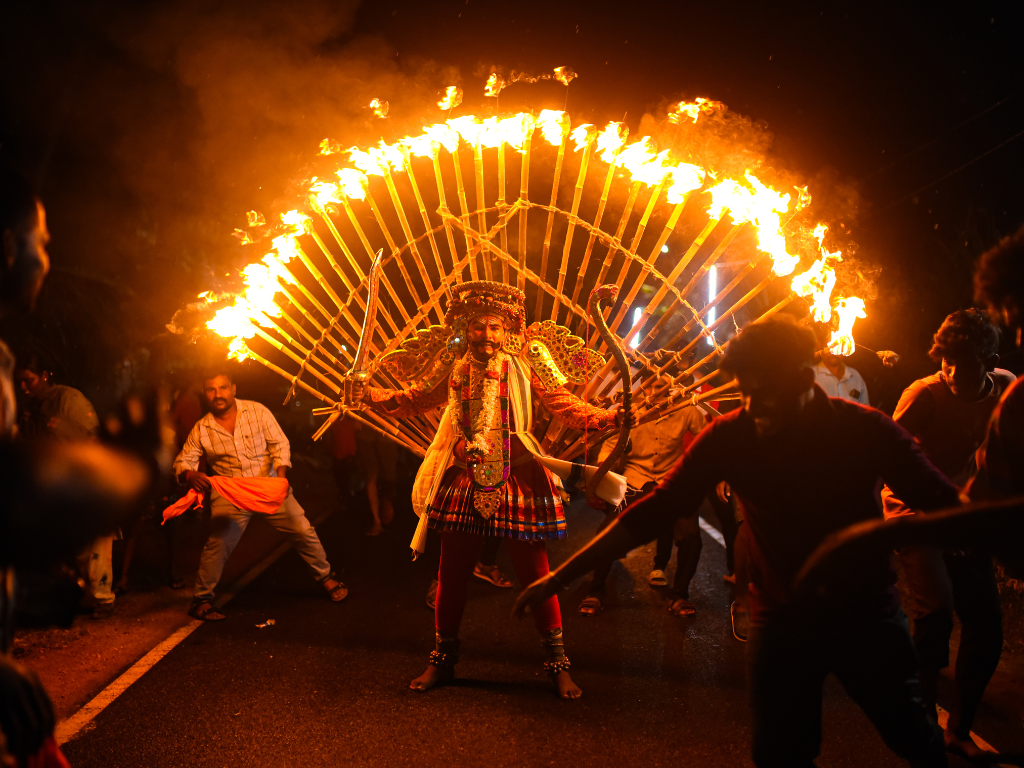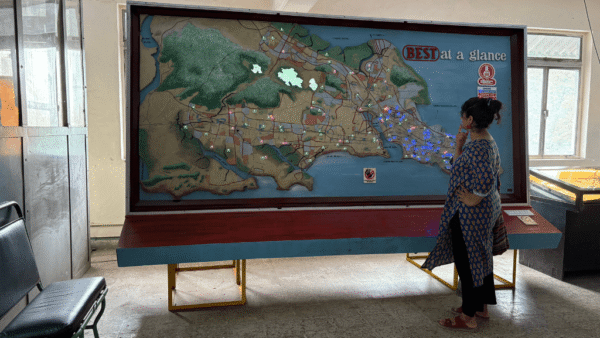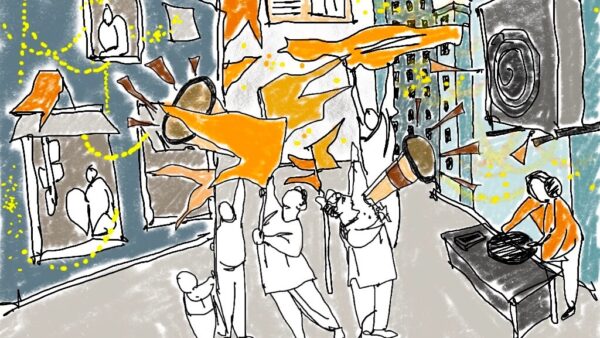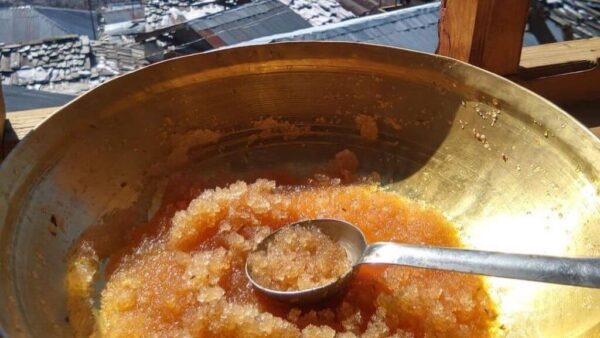Legends across India tend to be oral and retelling them is an important part of keeping them alive. While popular festivals like Diwali are celebrated with pomp and show, with the retelling of Rama vanquishing Ravana and returning to Ayodhya, or in the south, the story of Krishna finishing off Narakasura, several festivals unique to communities are less known. Celebrated in certain regions, they keep similar legends in public memory. The story of Madurai Veeran (the warrior of Madurai) is one such folktale performed as a play especially across Madurai, Erode, Namakkal and Salem districts.
Researcher Vananamala asserts that Madurai Veeran was born in the Sakkiliyar or Chakkiliyar clan. They are part of the Arunthathiyar caste which includes other groups too. Till recently, the Chakkiliyars were agricultural labourers, involved in leather crafts, tenant cultivation, small-time farming but were also folk musicians. Chakkiliyars were listed as ‘pariahs’ and ‘leather workers of Tamil districts’ by colonial officials during the caste-based census. It is said that famine, drought and industrial production of leather pushed the community out of traditional livelihoods forcing some to migrate to urban areas and take up sanitation work.[1]
The community’s folklore traditions include Muthuppattan Kathai, Ondi Veeran Kathai, and also the Madurai Veeran Kathai, the story of the guardian deity of the Meenakshi Temple in Madurai. Madurai Veeran’s story has many versions. It is believed that he was born to a king in Kasi (Varanasi). An astrologer foretold that he would bring misfortune to his kingdom, so he was abandoned. He was found by a couple from the Sakkiliyar caste who raised him. Veeran grew up to become a guard in the court of Bommanna Nayakan and married his daughter Bommai.
His fame brought him to Madurai where he was invited by Thirumalai Nayakar to protect the city from thieves. Veeran fell in love with the royal dancer Vellaiyammal, who was robbed by Sangili Karuppan and his gang of thieves. His plan to catch them backfired and he was falsely tried for treason by a vengeful Thirumalai Nayakar who was also in love with Vellaiyammal. Each of his limbs were mutilated as punishment for loving a woman of a higher caste. Both women, Bommai and Vellaiyammal, died by suicide after his death.[2]
Overwhelmed with guilt, Thirumalai Nayakar built a temple for him inside the Meenakshi Amman temple, and Madurai Veeran came to be deified as the protector of Madurai.[3] Though venerated as a story of a low-caste city protector, the honour killing of Madurai Veeran cannot be ignored. In all the versions, his caste status and his desire to rise above caste-appropriate behaviour are highlighted.
This was an honour killing in which the crime becomes absolved upon the deification of the person who died, observed Dr T Dharmaraj, a professor from the Folklore Department at St Xavier University, Tirunelveli.[4] He explains that there are more than 2,000 lesser known deities around Tamil Nadu celebrated as clan gods and goddesses. Madurai Veeran is considered the guardian deity of the Dalits. Other communities too know the legend but Dalits organise Madurai Veeran Koothu or Bandam — a performance depicting his story — every year in the belief that he will keep their towns and villages safe and free from diseases.
This festival is unique to towns of Tamil Nadu. The play, unlike popular performances such as Ram Leela, is not known nationally and does not have a script. The story lends itself to a unique narrative style every time it is performed based on the place and the artiste. This therukoothu (drama detailing life till death) is performed in open spaces close to temples, where people travel from far and wide.
The congregation usually gathers for three nights in a row and the story is performed, with songs and dance, from sunrise to sunset. But now budgets are smaller and people spend less time. A Koothu, or a detailed performance, lasts a night and costs between Rs 20,000 and Rs 25,000. In some towns, only the main parts are enacted in the form of Madurai Veeran Bandham – a dance-drama with fire. The performances stretch from the Tamil month of Thai to Puratasi – usually six months.
I travelled to Sivagiri, a town in Erode, 60 kilometres away from Namakkal, my hometown and was introduced to Bhavani D Manivel, 36, a painter by day and performer by evening. He invited me to watch his performance. His family has been performing traditional plays, including the Mahabharata, for generations. But the popular Madurai Veeran is their speciality.
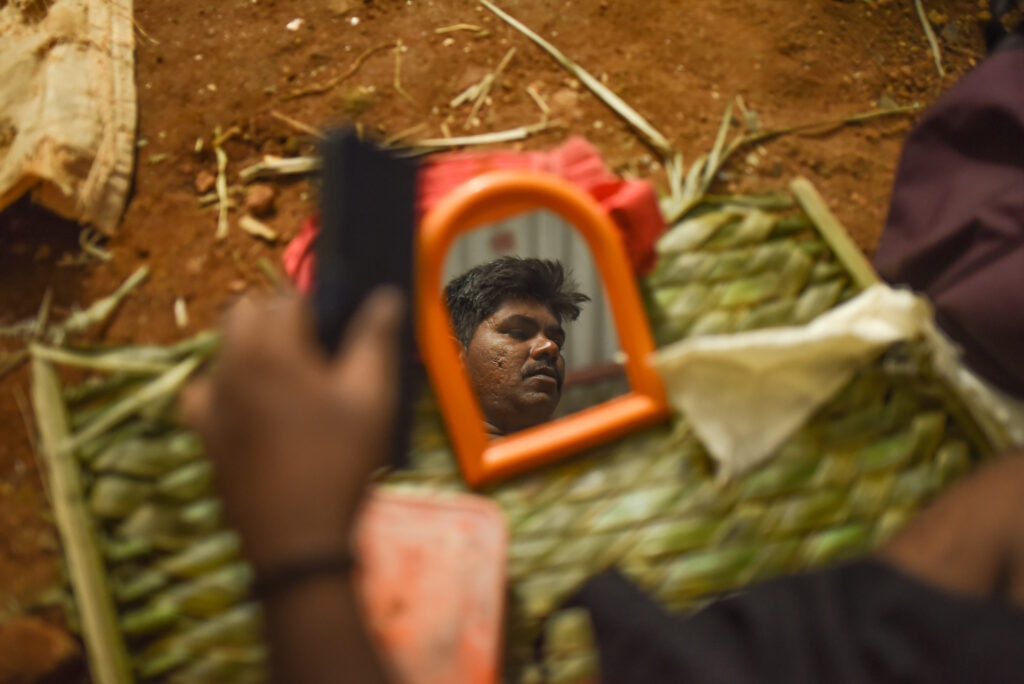
Manivel begins his makeup to transform into the warrior of Madurai. It will take him an hour to don the warpaint. He has been performing for the past two decades which makes it smooth and effortless for him. The play is performed in an open ground, near a temple, and Manivel’s greenroom is the open space, with people milling around.
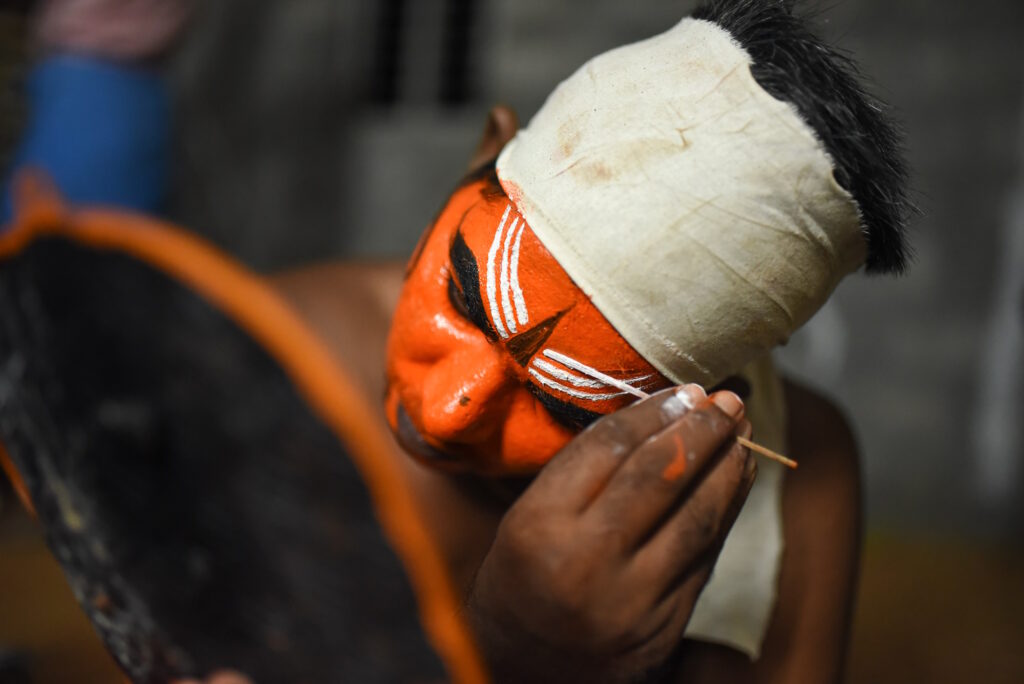
The 36-year-old artiste first paints his face using coconut oil mixed with vermilion (sindoor) and holy ash to get the orangish hue. It requires attention and meticulousness, and his painting skills come handy. Manivel’s deft strokes turn him into a striking warrior. His royal attire and menacing weapons complete the picture. He is all set to enter the stage as Madurai Veeran and enthral his audience.
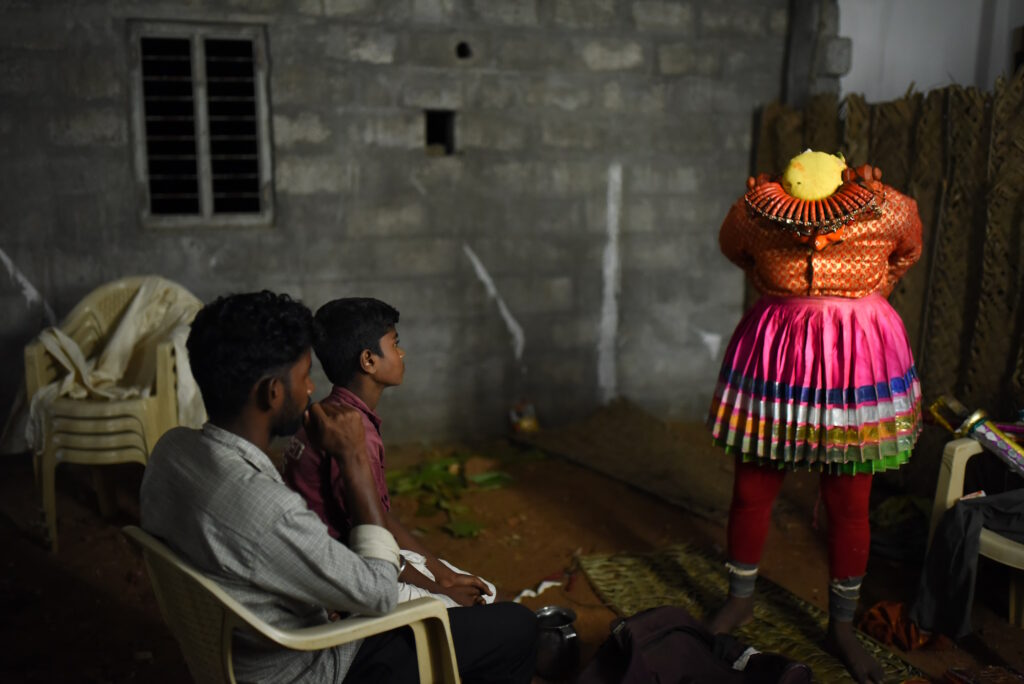
In this performance, there was no Koothu but only the Madurai Veeran Badham, a shorter version often staged because of fund crunch. A film by the same name starring Tamil superstar-turned-politician MG Ramachandran, popularly known as MGR, is screened.[5] It is said that MGR acted in this movie to capture a lower caste fan base, and he succeeded. The film, a huge hit, has become the mainstay at shows where it is not financially feasible to perform the entire play.
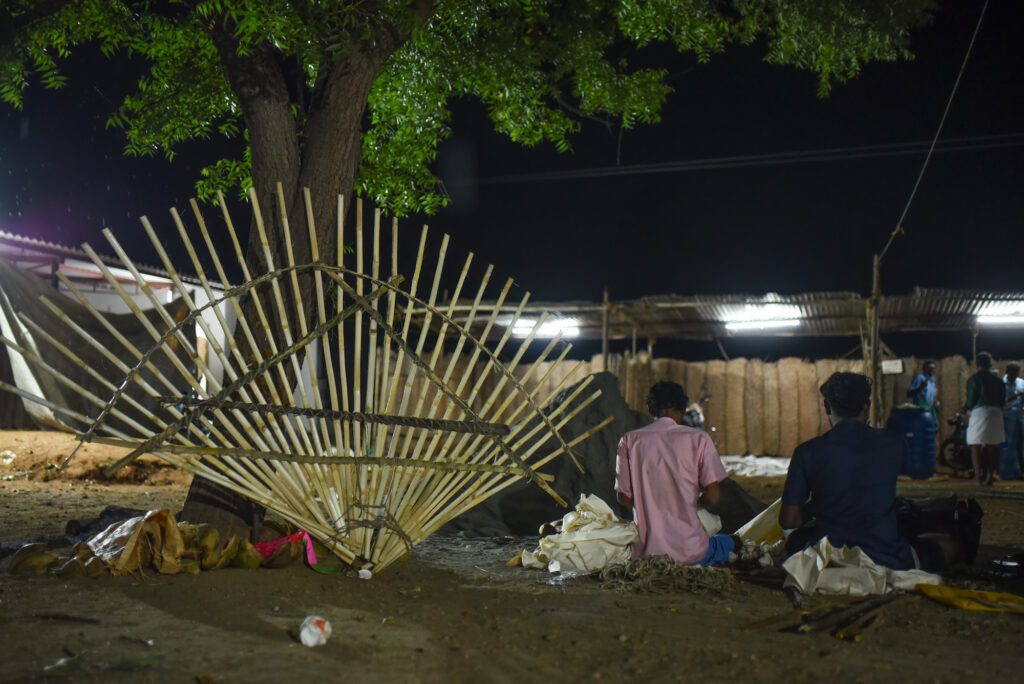
As Manivel gets ready to play the important role, workers prepare the bamboo frame, or bandham, which he will wear for his performance. The ends of the bandham are tied with cloth and wax. It has to fit him well so that he can strap himself well and move around comfortably. With the entire royal get-up, Manivel is no longer the meek painter – his piercing gaze and energetic steps are a prelude to the spectacular performance that the audience is eagerly waiting for.
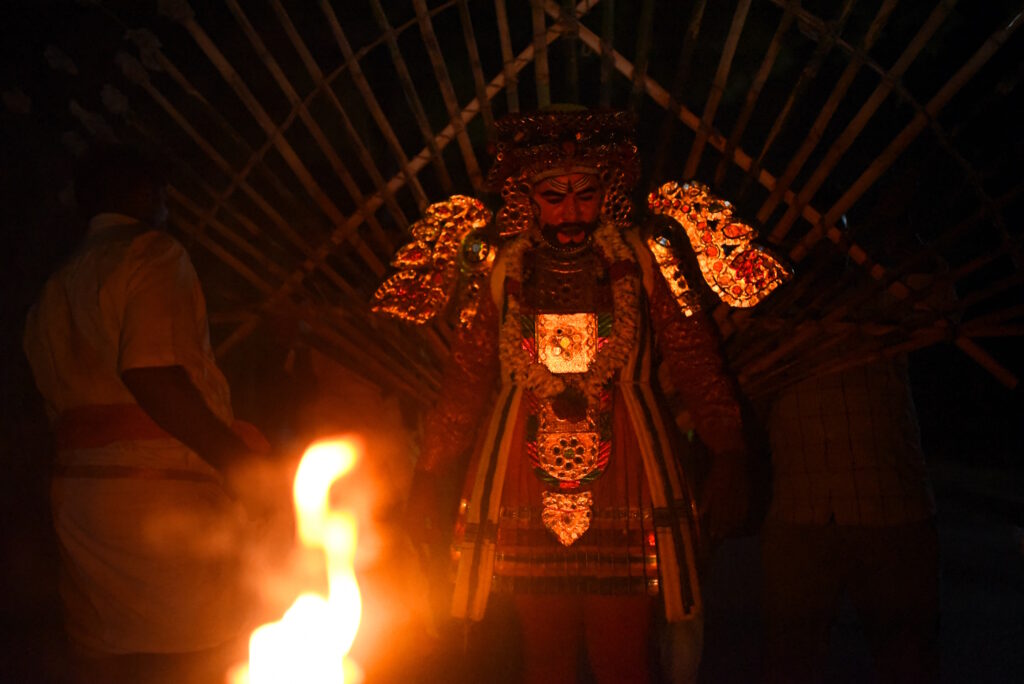
It is a solo act and Manivel’s experienced moves have the audience spellbound. As he appears as Madurai Veeran, the god, assistants light the bandham. Manivel acts like he is possessed by the spirit of Madurai Veeran -– roaring, dancing, and even chasing people, a way to assert his space over the land he protects. The assistants carry matchsticks and oil, keep a check on the flames and ensure that the fire goes on till Manivel enters the temple. The cloth wrapped at the ends of the bandham is covered with wax to keep the fire going for long.
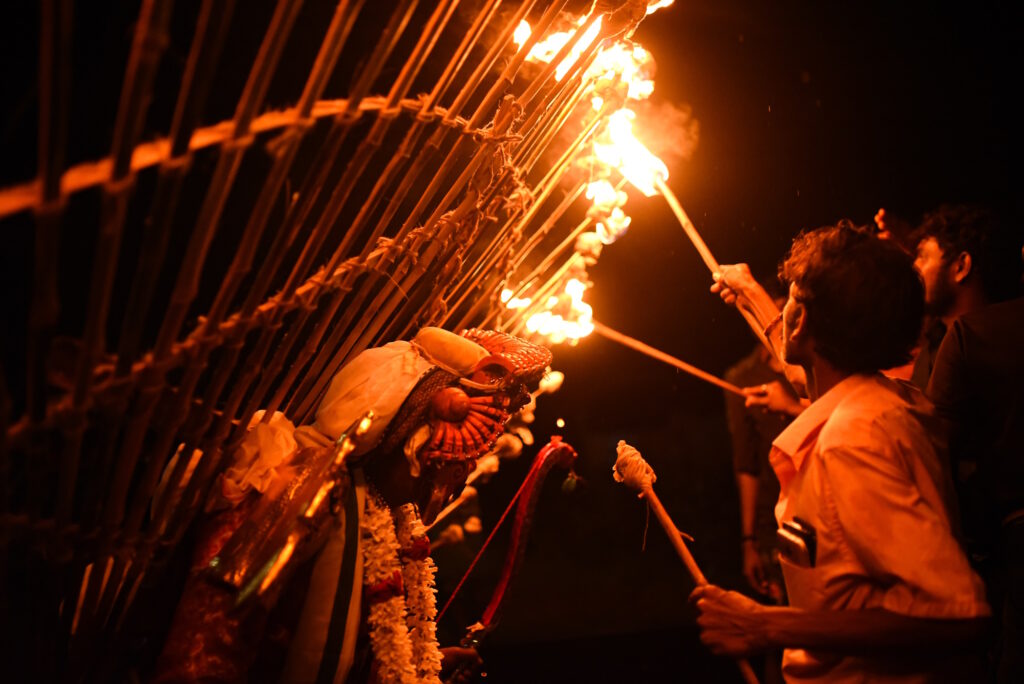
Manvel has already set the stage on fire, literally. The burning bamboo frame has turned Manivel’s face into a blazing warrior. The soft-spoken man is now a ferocious lion as Madurai Veeran. When he came charging at me, I instinctively ducked out of fear. At times, he looked like a peacock with illuminated wings because of the way he danced. He was the only one emitting light and moved like a shooting star in the dark night.
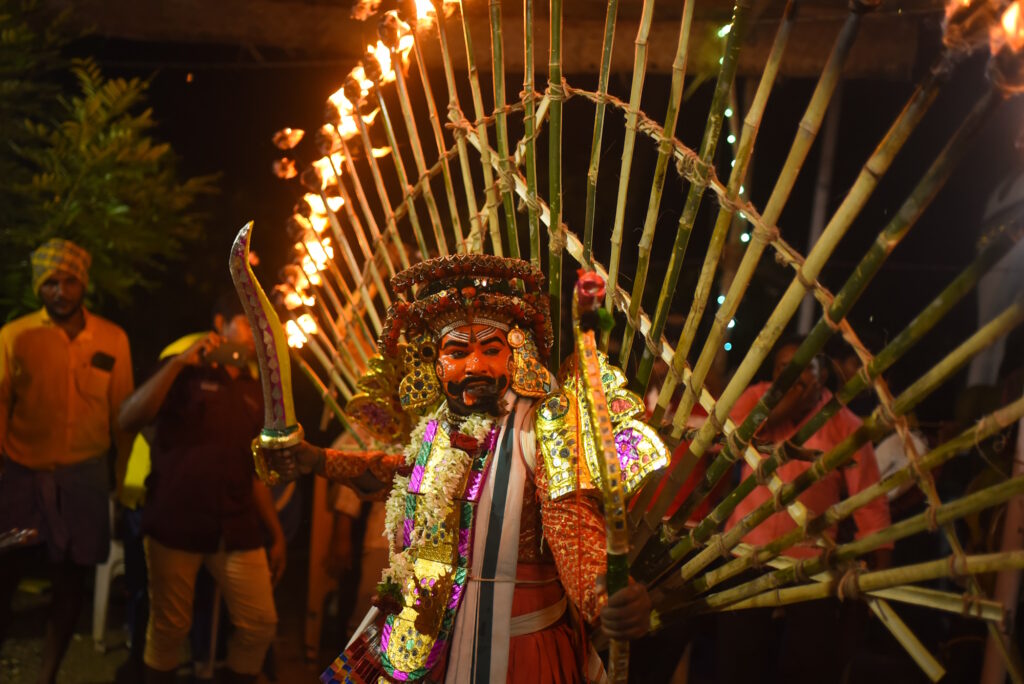
At the end, the artiste beheads a hen or a goat to offer a sacrifice to Madurai Veeran, asking him to protect the town. His assistants help him with this. I was told that he is supposed to aggressively chew off the head of the animal and drink its blood but it did not happen here. He only carried the head of the chicken in his mouth as an offering to the temple goddess inside the garbhagriha (sanctum sanctorum).
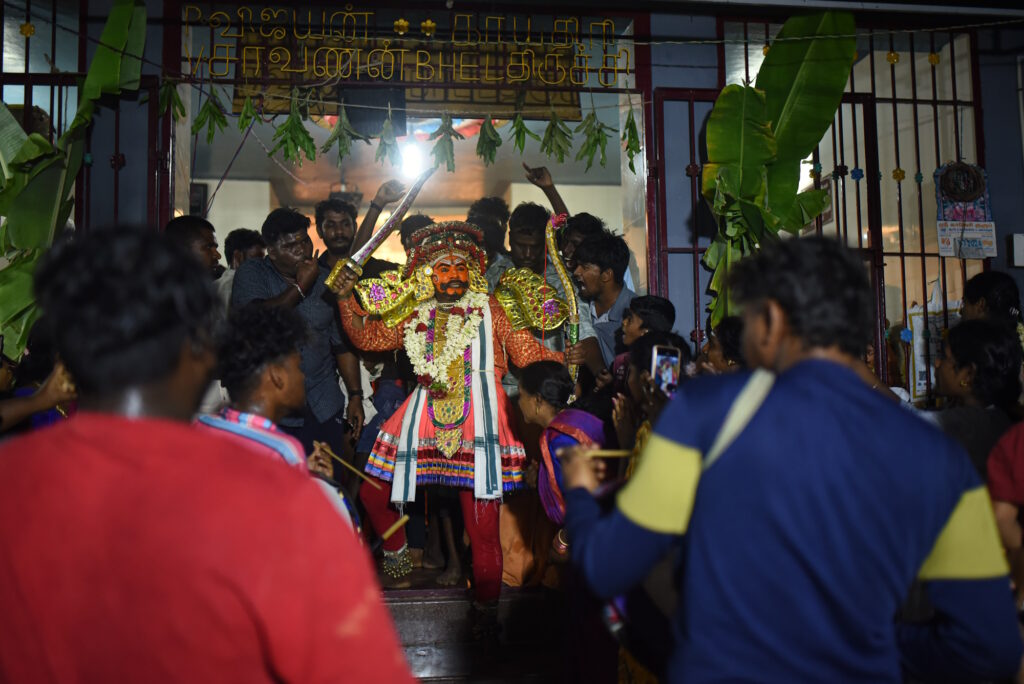
Inside the garbhagriha, he stands holding the sword in one hand, posing like a deity to show that he is indeed Madurai Veeran, the protector of the land. He has convinced his audience that he is, indeed, the great warrior. People start beating a drum called parai and pray to him for protection and prosperity of their families.
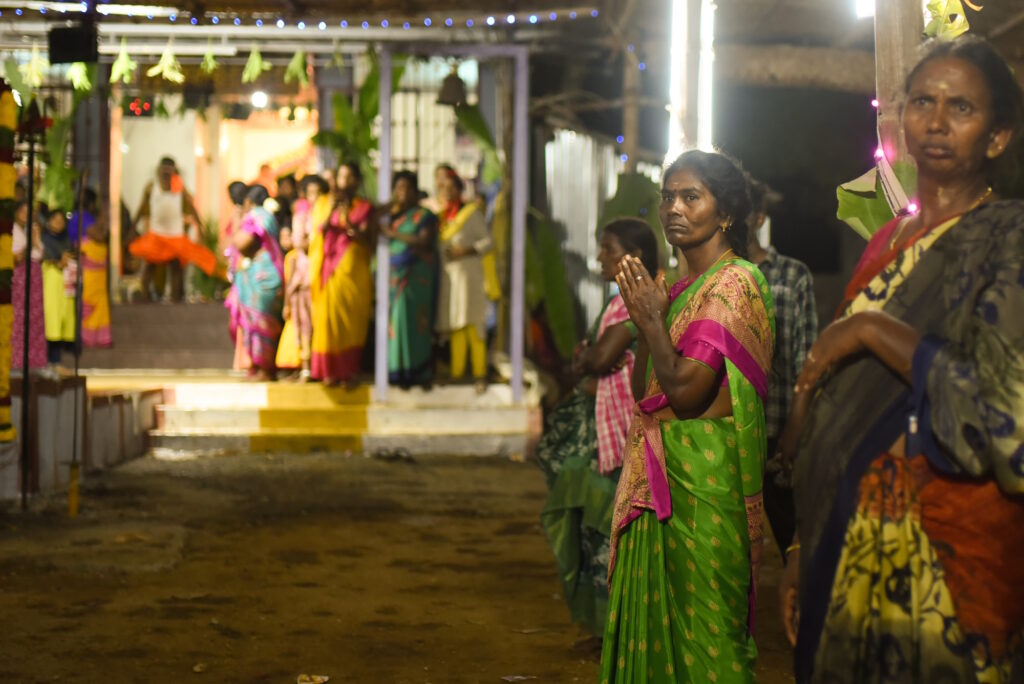
I do not believe in god or pray although my family does. I go with them to the temple but I have not found god there. Instead, I see god in people. When I saw people around me praying to Madurai Veeran, actually Manivel, I saw people place their faith in a human who becomes ‘god’ for sometime. Their faces glow with reverence, hope and trust. I saw the divinity in the eyes of the people when I stood behind Manvel.
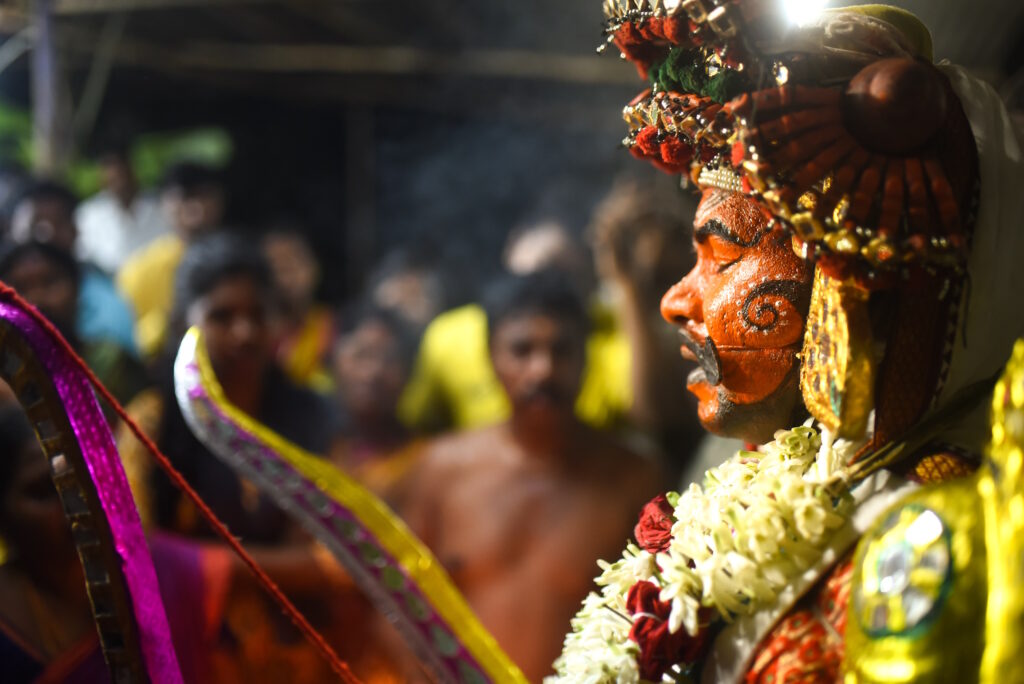
Here, you can see Manivel looking like Madurai Veeran but he is not the protector of the town anymore. Manvel became himself again — an exhausted performer. He announced the names of those who contributed to this production and the amount they had donated. This makes donors competitive who take great pride in hearing their names, and the play keeps going on. Sometimes, people offer money in a towel placed near the stage. The offering has gone digital as people can scan a QR code to donate.
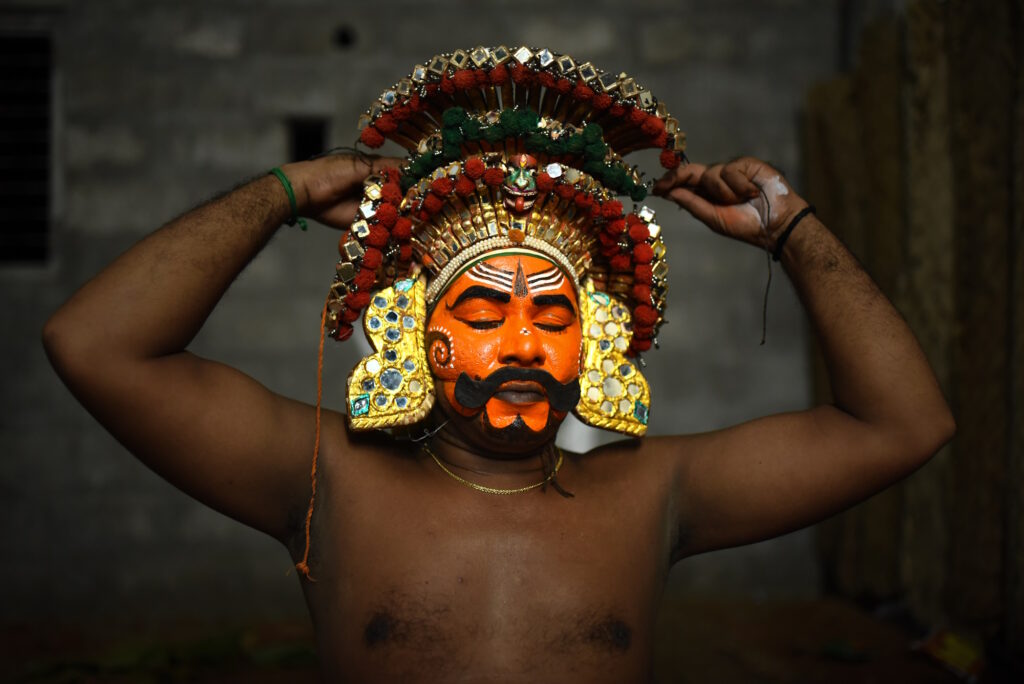
Manivel tells me, “Many photographers shoot my act, and I tell them my story. But I don’t get to see my photos or my story.” I told him that I would send him his photos. Or, come to Erode whenever I wish to meet the powerful Madurai Veeran.
Mano Baskaran is a budding photographer based in Tamil Nadu, weaving narratives through his lens. Actively pursuing theatre and documentary photography, he captures the intensity of traditional performances and everyday stories alike. Each project is a learning journey for Mano, as he delves deeper into cultural narratives and uncovers hidden layers.

